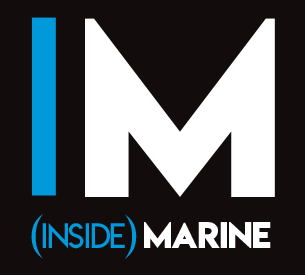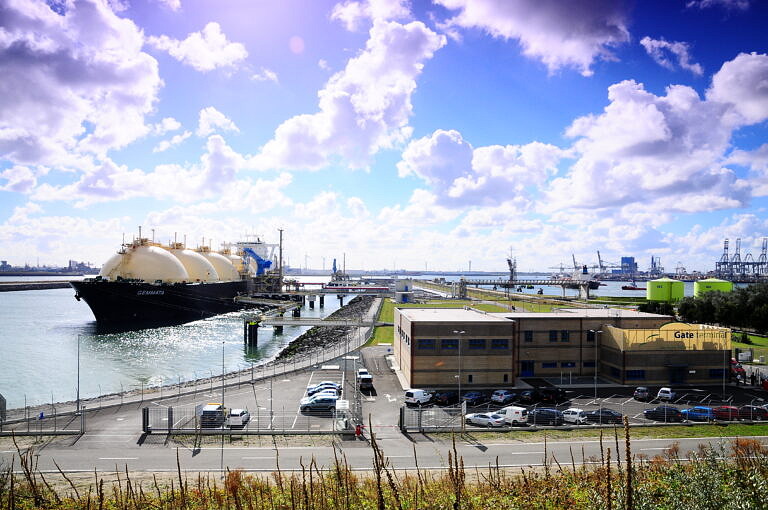Rotterdam Port Authority confirms total throughput for the first half of 2022 is slightly higher despite declining trade with Russia.
The volume of total cargo throughput in the port of Rotterdam was 0.8% higher in the first half of the year (233.5 million tonnes) than in the same period in 2021 (231.6 million tonnes). In many segments, the war in Ukraine led to significant changes. For example, imports of both LNG and coal rose very sharply as an alternative to reduced European imports of Russian gas by pipeline. The throughput of crude oil increased, with oil products falling off.
Throughput of iron ore, agricultural bulk and containers was lower than in the same period last year. Container transport to and from Russia has come to a halt, and persistent bottlenecks in global container logistics caused cargo to shift from large to smaller container ports. In anticipation of the sanctions on coal and oil, less Russian coal, crude oil, oil products and LNG were imported in recent months. Companies are increasingly importing from other countries.
Allard Castelein, CEO Port of Rotterdam Authority: “Europe relies heavily on Russian energy. The current geopolitical situation makes Europe very vulnerable. The availability of energy and raw materials at reasonable prices cannot be taken for granted. A positive development is that concrete steps have been taken in recent months to make our energy supply more sustainable and to further our energy independence, particularly through investment decisions to build a large biorefinery and Europe’s largest green-hydrogen plant.
“The business community has made a commitment in the last half year to invest € 3 billion in the energy transition. In addition to the vulnerability of the European energy system, nitrogen emissions continue to be a major bottleneck. Several major projects, including the CO2 capture and storage project Porthos, are being delayed or threatened by delays due to uncertainty and restrictions associated with nitrogen emissions”.
The Port Authority reported a good first half of the year financially. Revenue increased by 6.3% (€ 24.6 million) to € 412.2 million and operating expenses decreased by 2.4% (€ 3.1 million), mainly due to lower expenditure on sand extraction. Gross investments in the first half of 2022 amounted to € 117.1 million, including capital injections in participating interests (first half of 2021: € 100.5 million).
The most important investments for the first half of 2022 were the construction of quay walls in the Amaliahaven and the land reclamation operation in the Alexiahaven on Maasvlakte 2.
Dry bulk
The dry bulk segment saw an increase of 4.4% in the first half of the year. The throughput of agricultural bulk was down by 15.1%. High energy costs led to lower production by the German steel industry and, as a result, a fall of 20.6% in iron ore imports. The imports of cokes for the steel industry remained at the same level. Coal throughput for electricity plants rose sharply. On balance, this resulted in a 29.7% increase in coal throughput. Coal is currently cheaper than natural gas and it also reduces dependence on Russian natural gas. The 30.1% increase in other dry bulk is striking. It is primarily attributable to the high prices for the shipping of containers.
Liquid bulk
In the first half of the year, the transport of liquid bulk rose by 4.6%. The 4.3% increase in crude oil was mainly caused by the flow of Russian oil through Rotterdam to India in particular. Refineries in Northwest Europe are switching to non-Russian oil, with the result that Russian oil is finding its way to other markets. The 9.4% decline in the throughput of oil products is mainly due to the structural decline in the imports and re-exports of fuel oil. LNG rose by 45.8%. The 22.5% increase in other liquid bulk goods can be attributed, on the one hand, to a shift from transport in tank containers to chemical tankers and, on the other, to stockpiling by purchasers of chemical substances in the light of faltering transport chains.
Containers and breakbulk
The throughput of containers was down 4.4% (in TEUs). The decrease was 8.9% in terms of weight. The difference between the two is attributable to an increase in the number of empty containers. There are two principal reasons for the decline in container throughput. The first is the loss of container traffic to and from Russia due to the sanctions, the uncertainty associated with the continuation of trade with Russian parties, and the discontinuation of scheduled services to Russia. The second is the ongoing disruption of container logistics due to Covid-19.
Roll-on/roll-off traffic rose by 16.8%. This figure paints a rosy picture because of the end of the Brexit transition period on 1st January 2021. At the time, that led to additional transport in late 2020 and a dip in RO-RO transport in early 2021.
Other break bulk rose sharply by 17.7%. A major factor consisted of imports of steel and non-ferrous metals. In response to the Russian invasion of Ukraine, steel and non-ferrous prices shot up. Alternative suppliers were soon found, particularly from Asia, where Covid-19 actually led to a slump in demand for steel. Imports of steel and non-ferrous metal therefore increased. In addition, high container rates mean that more cargo is being shipped as break bulk.
Outlook
According to the Port of Rotterdam Authority, the current geopolitical situation is generating numerous uncertainties. Reliable energy supplies in Northwest Europe can certainly not be taken for granted. Energy prices are high, and this is a major factor in the sharp rise in inflation. A recession may follow. This makes forecasting throughput volumes for the second half of the year very difficult. In the energy transition, which is so important for the future of the port and for achieving the national climate goals, the required measures are again expected to emerge in the second half of the year. Solving the nitrogen problem is another crucial area.
Vivienne de Leeuw, CFO Port of Rotterdam Authority said: “Our robust financial position is essential to continue investing in traditional hardware such as quay walls and jetties in the years ahead, but particularly in infrastructure for the energy transition. In addition, we are continuing to invest in digitalisation. By maintaining our position as a port with world-class infrastructure, we are ensuring that we remain an attractive location for companies to invest in the transition.”


